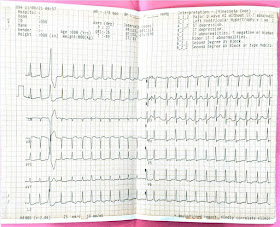I, Vanshika Savla, a 3rd sem student of 2k19 batch have been given this assessment on general medicine.
QUESTION 1: Please provide your peer review assessment on not only the the student's written case report but also the reading of the cases followed by the question answer session linked above in the video and share your thoughts around each answer by the student along with your qualitative insights into what was good or bad about the answer.
LONG CASE:
- The history taking was thoroughly done from top to bottom
- It has good discussion points to verify the probable diagnosis
- Examinations are bilaterally done where necessary
- Diagnosis is done based on current universal classification criteria and was done in a sophisticated fashion
- Possible case scenarios (unifying with the precise history taking) are included leaving no possibility of any type of diagnosis out of the blue
QUESTION 2: Please analyze the above linked long and short cases patient data by first preparing a problem list for each patient in order of perceived priority (based on the shared data) and then discuss the diagnostic and therapeutic uncertainty around solving those problems.
LONG CASE:
Problem list:
- Anasarca and pitting type pedal edema extending up to the middle of the leg
- Frothy urine (indicating proteinuria)
- Severe joint pains (Bilaterally symmetrical progressive inflammatory polyarthritis)
- Morning stiffness
- Burning sensation in eyes
Proteinuria causing anasarca strongly supports glomerular pathology. Proteinuria can lead to higher risk of progressive kidney problems. Anasarca if not limited may lead to painful swellings, stiffness and the area becomes more prone to skin infections. Complaints of burning sensation is possibly due to inflammation of eyes which comes as a complication to polyarthritis.
QUESTION 3: Testing competency in "Evidence based medicine": Include the review of literature around sensitivity and specificity of the diagnostic interventions mentioned and same around efficacy of the therapeutic interventions mentioned for each patient.
LONG CASE:
Water restriction of about 500 - 1500 ml per day is usually prescribed. The main rule is the excretion of free water should be in excess of the restricted free water taken in. An increase in dietary protein and salt can improve water excretion. Prednisolone eye drops are given to reduce inflammation as it has good intraocular anti inflammatory effect. Febuxostat is given to prevent gout attacks as it tries to decrease the uric acid in the blood. This drug should be taken regularly to prevent further accumulation of uric acid. Reversal of gout can’t be possible with this drug. Although there are a few side effects like chest pain, breathlessness, nausea etc. and in such case, approaching the doctor would be advised.
DMARDs can be given to stress the immune system to slow down rheumatoid arthritis. Methotrexate is widely prescribed to patients newly diagnosed with RA. It is taken in a lower dose than prescribed for cancer patients.
QUESTION 4: Share the link to your own case report this month of a patient that you connected with and engaged while capturing his her sequential life events before and after the illness and clinical and investigational images along with your discussion of that case.
QUESTION 5: Testing scholarship competency in logging reflective observations on your concrete experiences of this month











